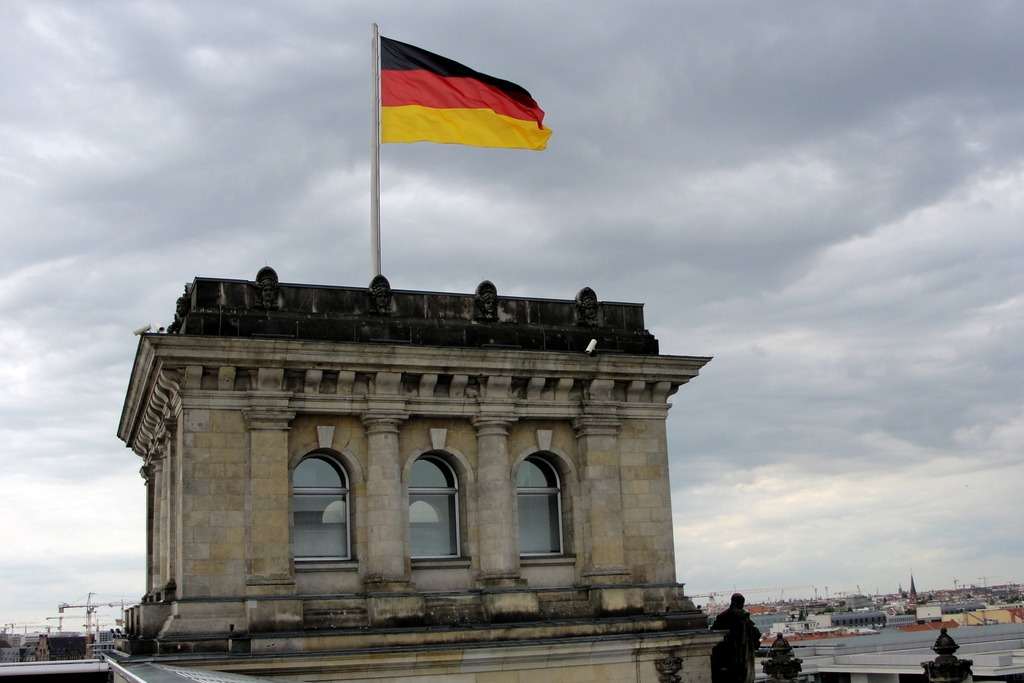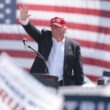In April 1945 I was liberated in my hometown of Koethen by US forces. I did not understand this, of course. I was only three years old and had survived a number of allied bombing runs in the basement of our house with my mother and my three siblings. My father had died at Stalingrad in 1942. The American GIs helped us to survive. Lots of milk powder and scrambled eggs were hugely welcome. Starvation had set in, and a genuine famine ravaged defeated Germany.
As a 17-year-old exchange student, I lived in the small town of Mexico, Missouri. Some of America’s first ICBMs were stationed nearby. We didn’t know. I fell in love with my American family, the American way of life, American literature, Jazz, the political system. I lettered in track. I watched the Nixon-Kennedy debate on TV shortly before I left the States to go home to Germany.
Looking back at those formative years, I feel deeply embarrassed by Donald Trump as if he were my own president. In the long run, he will be a bizarre footnote in the history of the transatlantic Alliance. As of today, his weird behavior seems to be scripted by Stephen Colbert. Trump’s performances at the G7 meeting and the Nato summit are difficult to capture without resorting to satire.
Trump’s recent complaints about the seemingly minuscule German financial contribution to NATO’s defense posture appeared to be legitimate at first glance. And yet, they are not. Berlin’s defense budget of approximately 1.5% of the GNP represents the mood of the people and the decisions of our parliament. We are still an independent democracy.
It is true that America’s military budget is nearly twenty times higher than Germany’s. But that’s the price for America’s projection of global power. It comes with tremendous (yes!) trade benefits for the United States. American companies like Google or Facebook earn tax-free billions in tired old Europe. They, too, feel protected. In fact, Europe is by far the biggest market for American products. Trump doesn’t understand that, yet.
Do Germans have to apologize to the American taxpayer for the cost of US military power projection abroad? Perhaps the poor people from Kansas or Alabama should take a closer look at their military. Could it be that the Pentagon has no idea how to spend those 700 billion dollars year after year? “It’s too much,” General Petraeus admitted in a private conversation when on a visit to Berlin recently.
We do not feel threatened by the “Red Army.” It doesn’t exist anymore. For half a century its tank divisions stood in East Germany, ready to pounce. After the wall came down, they rolled home to mother Russia, which was already disintegrating. In those waning years of the Cold War, the West German army consisted of up to half a million drafted young men (no women), all of whom “could read and write”—Helmut Schmidt said to Jimmy Carter—and within two days an additional million could have been mobilized. That is no longer the case.
Russia’s national GDP is equivalent to that of Spain. In order to wage war with the West, Moscow’s oligarchs, Putin included, would have to first siphon back their billions of loot hidden abroad. That would be against their thug’s honor. And why should Putin attack the cash-paying German customers of their gas exports? By the way, Mr. President, it’s not 70 percent of our national energy consumption. It’s less than 30 percent. (No wonder his casino went down the drain.)
It is true, today’s Bundeswehr of 180,000 professionals has become the laughing stock of American officers, German war buffs and most probably also of the Russians. The fact that only 80,000 German soldiers would be combat-ready, if only their planes could deploy them to far-away places (which they cannot) is, historically speaking, unique. Our few tanks are “kaputt,” many of our fragile old jets are grounded, our submarines would sink forever if they’d leave their harbors (which they haven‘t done in a year.) Our submachine guns, the infamous, over-heating Heckler & Kochs, are useless when fired for a longer period or in a desert climate. There are, however, no complaints about our military bands. We are a Musiknation, after all. Goose-stepping into a liberated Baghdad to the tune of Beethoven’s “Yorksche Marsch” would have been deeply alien to the Germans, half a century after World War II. We’d rather not.
In short, all we truly have to offer to America’s and Nato’s allies’ security is ourselves—as the once designated battleground of the last seven decades, firmly imprinted in the war plans of the by now dysfunctional Warsaw Pact and our own Nato partners. Some politicians remember that.
The reluctance of our parliament to provide more funds for a working army equipped for contemporary purposes—i.e. quick interventions in far away trouble spots—may have a deeper cause than Trump’s assumption of a greedy German nation enjoying a free ride under an American nuclear umbrella.
Today, Germans don’t know exactly who they should be afraid of, except immigrants. The only possible enemy of yore, Russia, could not afford an old- fashioned war anymore. Moscow’s cyber-war shenanigans pale against NSA’s attacks on the phone calls of Angela Merkel and her cabinet members.
Yet the deeper reason for the pacified German posture may be found somewhere else. For half a century after 1945, a divided Germany was the heavily armored territorial theater of the Cold War. In the early fifties, during the short period of America’s nuclear supremacy, the idea of a preemptive strike against the Russian occupying power in Central and Eastern Europe was en vogue at the Pentagon. American records show that such a strike would have been initiated with the annihilation of Soviet command posts in and around Berlin. The deployment of no less than 90 nuclear bombs (!) was considered to be sufficient. The death of 6000 Allied soldiers in West Berlin would have been chalked up as collateral damage. This “preemptive” strike could have initiated a limited counter strike by the Russians. The United States would have easily survived as a victorious nation. The deplorable Germans of course would have been wiped off the map completely and forever, poisoned by endless fallout.
Helmut Schmidt, a strategist with real war experience and German chancellor during a risky period of Russia’s aggressive rocket deployments (the vaunted SS 20) explained to this author that – in case of a conventional invasion of Germany by Soviet forces—the Bundeswehr would have capitulated immediately, simply to avoid a nuclear escalation and the concomitant total destruction of the country and its people.
However, nuclear deterrence worked. Peace was maintained. It is the greatest foreign policy achievement of the United States and its Nato allies.
Donald Trump may want to fold the Pentagon’s nuclear umbrella over Europe, with the exception perhaps of his precious golf courses. That umbrella still functions as a deterrent against potential war-mongers, including Iran, which thanks to strategic Trumpology will soon be free to return to its nuclear centrifuges. In that case, the grammar of deterrence would demand the immediate nuclearization of the German forces. Technically it would not pose a problem. Politically and legally, however, this would not be possible in a nation that is still proud of its democratic institutions. Arming Germany with nukes would need a commitment by the Bundestag, the German parliament. That would never happen. Our so called „value-based“ society does remember the origin of our democratic values; they arrived here in the backpacks of American soldiers in 1945.
At this moment, there are 3791 members of the Bundeswehr stationed abroad, the largest contingent still in Afghanistan. Nobody in Berlin however believes anymore that “Germany’s freedom is being defended at the foot of the Hindukush.” That was claimed by our Secretary of Defense seventeen years ago; by now, most Germans have no idea where these mountains are. We don’t care. But what do the American voters know?
Some say that Germany’s attitude towards defense is an inexcusable strain of strategic cowardice. Others point out that following America’s lead into wars from Vietnam to Iraq would have provided the German nation with the same old smell of defeat which they still remember from their own history. Yes, the Germans don’t want to be “great again,” except in soccer. And even that did not work out.
Michael Naumann was the CEO of Metropolitan Books and Henry Holt and Germany’s first post-war cultural minister in the Schröder government. Today he is director of the Barenboim-Said Academy in Berlin, training young musicians from the Middle East, Israelis included.







0 Comments